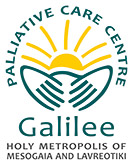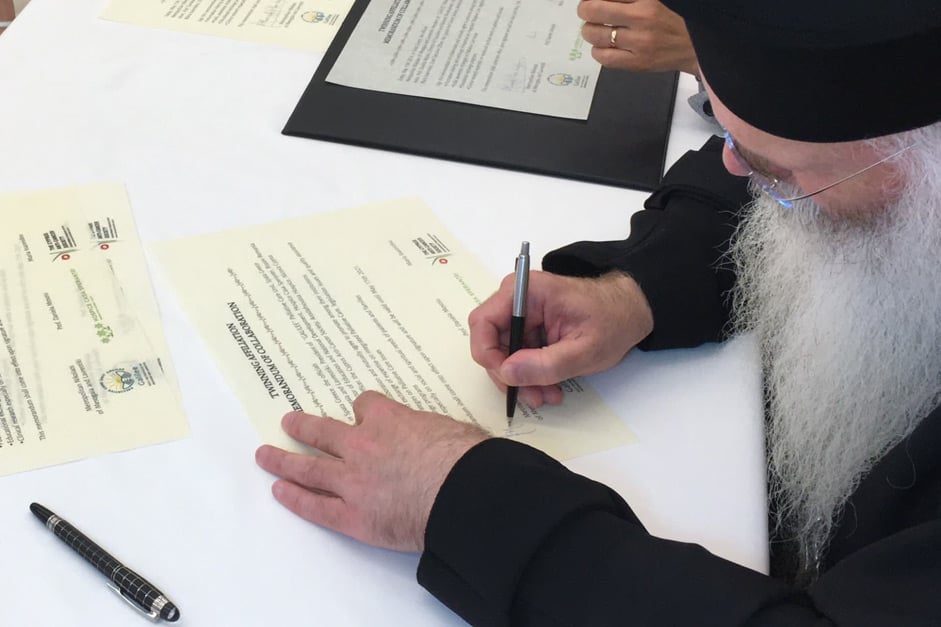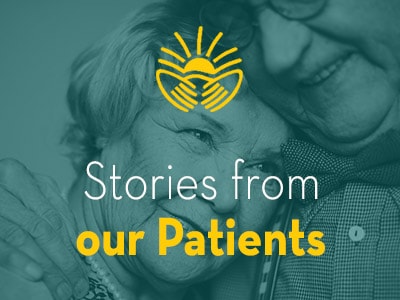We work with national and international partners in order to facilitate the mutual exchange of knowledge, expertise, and know-how, enabling us to provide better care to our patients. At the same time our interdependent cooperation helps us to deal with practical problems and save resources.
Hospice Casa Sperantei: Our first and most important partner was and still is Hospice Casa Sperantei. Their mentors and trainers continue to generously share their specialised knowledge, expertise, and wealth of experience, meaning that above all we never feel alone in our work.
The Hospice Casa Sperantei Foundation was founded in 1996. It is one of the most important centres of palliative care worldwide. It has two integrated service centres, in Bucharest and Brasov, employs over 200 staff, runs several hospices for adults and children with life-threatening diseases, a home-care programme, a day care centre, and an internationally-recognised palliative care education centre.
Arodafnousa: Another of our important partners is Arodafnousa Hospice of the Cyprus Anti-Cancer Society
The Cyprus Anti-Cancer Society (established in 1971) is a registered charity that cares for people with cancer providing them with complete palliative care services in line with international standards. Our aim is to support patients’ families and carergivers, and it also informs the wider public about cancer prevention, diagnosis, treatment, and relief. It operates two Palliative Care Centres, Arodaphnousa in Nicosia and Evagorion in Limassol. Arodaphnousa Palliative Care Centre was the first Hospice in Cyprus, founded in 1976, and it operates a residential hospice as well as home care services and patient transport services for patients from the whole of Cyprus.
Galilee Palliative Care Centre has been twinned with these two hospices since 2016.
The three organisations officially joined forces as “sister hospices” on 15 May 2016, following an initiative of Metropolitan Nikolaos of Mesogaia and Lavreotiki. The aim of this threefold partnership is to exchange information and expertise on palliative care, legislation, and quality assurance; to work on policies to increase public awareness of palliative care; to deliver joint training programmes; and to carry out clinical research.
All three hospices are pioneers in their own countries. All three provide palliative care free of charge to cancer patients and their families, and all three aim to prevent and relieve the mental and physical symptoms caused by a life-threatening illness.
The three organisations also work together on public awareness campaigns and training programmes for healthcare workers and non-specialists on subjects related to palliative care and the respective legal framework.
European Association of Palliative Care (EAPC)
“Galilee” cooperates mainly with EAPC in the context of the RESPACC program
University of Navarra
“Galilee” during 2020, started cooperating with the University of Navarra in Spain, within the context of the RESPACC program
IAHPC
“Galilee” collaborates with IAHPC in the project “Global Palliative Care Database”
St Columba’s Hospice
A very innovating and creative collaboration started in 2020 between “Galilee” and St. Columba’s Hospice in Scotland, UK, as part of the “International Song-writing Project for change, loss and grief”.
Partnerships with hospitals: comprehensive care provision
Galilee Palliative Care Centre also works in partnership with many hospitals in Greece, since palliative care can also be provided to patients receiving curative or life-extending treatment.
A protocol of cooperation was signed between St Savvas Hospital and the Holy Metropolis of Mesogaia and Lavreotiki in 2010 for the provision of palliative care at home to patients with advanced cancer. St Savvas refers to those cancer patients who are receiving treatment at the hospital, who live in our catchment area, and who wish to benefit from our home care programme. Our interdisciplinary team provides the home nursing free of charge, while medicines and clinical examinations are prescribed by doctors from either the hospital or the hospice.
A protocol of cooperation was signed between the 1st Neurological Clinic of Aiginiteio University Hospital of Athens and Galilee Palliative Care Centre in 2016 to deliver a two-year pilot project. As part of this project the hospice provided home palliative care to ALS patients from Aiginiteio Hospital resident in our catchment area. Patients and their families were provided with a range of services including information on the course of the disease, physical, psychological, social, spiritual and practical support, and end-of-life care. Bereavement support was also provided to families. The hospice provided care and support free of charge, while the hospital undertook the initial evaluation of patients, coordinated the programme, and provided them with information.
The two organisations kept a file on all patient care data, while at the end of the two-year period they presented a report on the project, focusing on the issues and problems that emerged, and suggestions for improvement.
After the successful 2 year pilot project, the collaboration has been renewed and continues to the present day.
As part of the project, Galilee Palliative Care Centre provided its experiential knowledge of palliative care and joint training on the basic principles of the discipline, while Aiginiteio Hospital offered its expertise on the disease and care for ALS patients.
A protocol of cooperation was signed between Galilee Palliative Care Centre and the 401 General Military Hospital of Athens in 2018 in order to provide a joint programme, “Galilee” provides residential or home care to patients who are referred to us by the hospital. The hospital in turn takes care of the patients’ laundry, as well as their nutrition programmes and meals, depending on their needs.
They also work together on training programmes for the hospital’s staff and public awareness programmes on palliative care and the work of the hospice.


